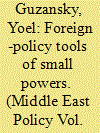| Srl | Item |
| 1 |
ID:
085902


|
|
|
|
|
| Publication |
2009.
|
| Summary/Abstract |
The purpose of this paper is to redress the relative shortage of small power studies, expand the theoretical understanding pertaining to this peculiar type of states and reassert the term 'small power' in the relevant literature. The field of international relations (IR) that is devoted to small powers is limited, at least when compared to the material available for larger powers, as small powers were seemingly neglected during the Cold War era. However, small powers today have increased in numbers, as has their impact on the international system; hence, it is imperative that all pertinent definitions and attributes of small powers are examined in order to challenge the consistency and credibility of the term 'small state' over 'small power', as different connotations apply in either case.
|
|
|
|
|
|
|
|
|
|
|
|
|
|
|
|
| 2 |
ID:
142158


|
|
|
|
|
| Summary/Abstract |
This article analyzes the foreign-policy tools that Kuwait, Qatar, Bahrain, the United Arab Emirates (UAE) and Oman use in dealing with Iran. It argues that a policy of strategic hedging reduces the danger of conflict with Iran in the short term, while preserving contingency plans that address the severity of the threat and the uncertainty of the relationship in the long term. We could have expected that, because of their sense of threat, the small Gulf states would adopt a behavior of balancing Iran's power or, alternatively, of bandwagoning with it. However, these states have consciously chosen to adopt a “mixed” policy that includes elements of both methods. This stands in contrast to the assumption, widespread in the international-relations field, that they would choose to either balance1 or bandwagon as a way of coping with threats.
|
|
|
|
|
|
|
|
|
|
|
|
|
|
|
|